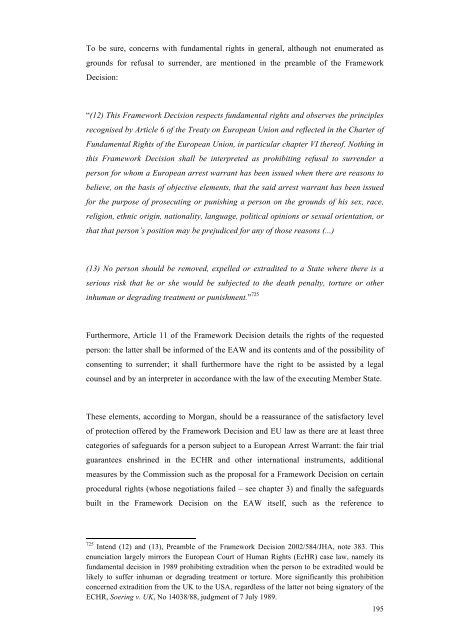The evolution of European Union criminal law (1957-2012)
The evolution of European Union criminal law (1957-2012)
The evolution of European Union criminal law (1957-2012)
Create successful ePaper yourself
Turn your PDF publications into a flip-book with our unique Google optimized e-Paper software.
To be sure, concerns with fundamental rights in general, although not enumerated as<br />
grounds for refusal to surrender, are mentioned in the preamble <strong>of</strong> the Framework<br />
Decision:<br />
“(12) This Framework Decision respects fundamental rights and observes the principles<br />
recognised by Article 6 <strong>of</strong> the Treaty on <strong>European</strong> <strong>Union</strong> and reflected in the Charter <strong>of</strong><br />
Fundamental Rights <strong>of</strong> the <strong>European</strong> <strong>Union</strong>, in particular chapter VI there<strong>of</strong>. Nothing in<br />
this Framework Decision shall be interpreted as prohibiting refusal to surrender a<br />
person for whom a <strong>European</strong> arrest warrant has been issued when there are reasons to<br />
believe, on the basis <strong>of</strong> objective elements, that the said arrest warrant has been issued<br />
for the purpose <strong>of</strong> prosecuting or punishing a person on the grounds <strong>of</strong> his sex, race,<br />
religion, ethnic origin, nationality, language, political opinions or sexual orientation, or<br />
that that person’s position may be prejudiced for any <strong>of</strong> those reasons (...)<br />
(13) No person should be removed, expelled or extradited to a State where there is a<br />
serious risk that he or she would be subjected to the death penalty, torture or other<br />
inhuman or degrading treatment or punishment.” 725<br />
Furthermore, Article 11 <strong>of</strong> the Framework Decision details the rights <strong>of</strong> the requested<br />
person: the latter shall be informed <strong>of</strong> the EAW and its contents and <strong>of</strong> the possibility <strong>of</strong><br />
consenting to surrender; it shall furthermore have the right to be assisted by a legal<br />
counsel and by an interpreter in accordance with the <strong>law</strong> <strong>of</strong> the executing Member State.<br />
<strong>The</strong>se elements, according to Morgan, should be a reassurance <strong>of</strong> the satisfactory level<br />
<strong>of</strong> protection <strong>of</strong>fered by the Framework Decision and EU <strong>law</strong> as there are at least three<br />
categories <strong>of</strong> safeguards for a person subject to a <strong>European</strong> Arrest Warrant: the fair trial<br />
guarantees enshrined in the ECHR and other international instruments, additional<br />
measures by the Commission such as the proposal for a Framework Decision on certain<br />
procedural rights (whose negotiations failed – see chapter 3) and finally the safeguards<br />
built in the Framework Decision on the EAW itself, such as the reference to<br />
725 Intend (12) and (13), Preamble <strong>of</strong> the Framework Decision 2002/584/JHA, note 383. This<br />
enunciation largely mirrors the <strong>European</strong> Court <strong>of</strong> Human Rights (EcHR) case <strong>law</strong>, namely its<br />
fundamental decision in 1989 prohibiting extradition when the person to be extradited would be<br />
likely to suffer inhuman or degrading treatment or torture. More significantly this prohibition<br />
concerned extradition from the UK to the USA, regardless <strong>of</strong> the latter not being signatory <strong>of</strong> the<br />
ECHR, Soering v. UK, No 14038/88, judgment <strong>of</strong> 7 July 1989.<br />
195
















